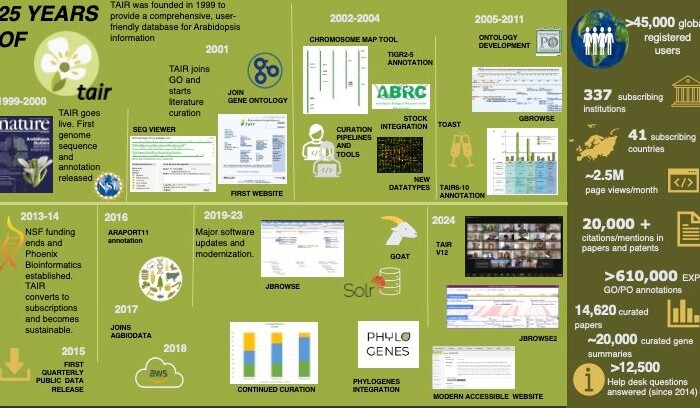Phoenix Bioinformatics was founded in 2013 in response to a funding crisis at The Arabidopsis Information Resource. TAIR is an indispensable knowledgebase of expert-curated information for basic and applied research in plant genetics and biology. About a decade ago, despite its importance to a large global user base, TAIR’s principal funder declined to continue providing grants to support its basic operations. The leadership of TAIR had the idea of sustaining operations with a metered-access model, which turned out to be a tremendous success. Subscriptions from universities, companies and plant researchers all over the world have allowed TAIR to continue digesting knowledge from the ever-growing research literature and making it accessible for researchers and educators. This rapid transition to a sustainable business model was managed under the auspices of a new nonprofit, Phoenix Bioinformatics.
TAIR’s story is just one of many that could be used to illustrate how the way we fund research infrastructure has failed to keep pace with the dramatic increase in the reliance of researchers on databases, software and other kinds of digital resources. Many of the tools researchers use on a daily basis are developed by academics with funding from short-term grants. They lack long-term funding to support the workforce of information curators and software developers that keep them running and up-to-date.
From the beginning, Phoenix was intended to be an organization that would have the know-how and capacity to help other digital research resources manage the same transition from grant funding to long-term sustainability. To that end, Phoenix has entered into successful partnerships to support non-grant revenue models for a diverse mix of other important resources, ranging from curated databases to online research software platforms. As a nonprofit, Phoenix strives to balance the competing demands of accessibility and sustainability in developing sustainability models that are tailored to the unique circumstances of each project.
As one of the original four founders, and its first Executive Director, Eva Huala took Phoenix from that initial bold idea to the successful organization it is today. Her impact has been tremendous. As Chairperson of the Board of Directors, and on behalf of Phoenix’s staff, partners, and the wider community of users, I wish to convey our profound gratitude for all she has achieved.
After eight years, Dr. Huala wishes to pass the baton, and will be stepping down from her role at the end of the year. As a result, we are announcing an open search for a new Executive Director to take Phoenix on the next stage of its journey. We are looking for a leader who will inspire the scientific community to rise to the challenge of sustaining critical digital research resources, someone who brings a spirit of entrepreneurship and innovation to the task, and someone capable of overseeing the continued success of the organization and its talented, dedicated team.
I ask that you please help us spread the word of this opportunity through your networks, and I thank you in advance for your help.



